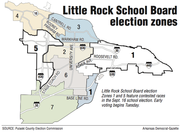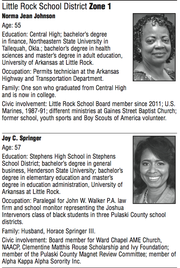Joy C. Springer knows the Little Rock School District well because she's worked for 23 years as a member of the legal team representing black students known as the Joshua intervenors in a federal school desegregation lawsuit.
RELATED ARTICLES
http://www.arkansas…">Jacksonville-area vote on school district a 1sthttp://www.arkansas…">Changes in district on minds of 4 candidateshttp://www.arkansas…">Carreiro, Ross vie for Zone 5 positionhttp://www.arkansas…">Schools focus as early voting starts Tuesdayhttp://www.arkansas…">Tax rates steady in 3 districtshttp://www.arkansas…">Millage elections, proposed changes across state
Now Springer, 57, a paralegal for the John W. Walker P.A. law firm and, as such, a monitor of district schools in the Pulaski County school desegregation case, wants to become one of the district's decision-makers. She is challenging incumbent School Board member Norma Jean Johnson for election Sept. 16 to the Zone 1 position on the seven-member Little Rock School Board.
Early voting in the election can take place from Tuesday through Friday and on Sept. 15.
Johnson, 55, a former member of the U.S. Marines Corps and now a permits clerk at the Arkansas Highway and Transportation Department, has represented the zone that encompasses east and downtown Little Rock for one three-year term.
During her term, Johnson said, the board hired a superintendent and opened the new Forest Heights math and science academy and the Geyer Springs gifted and talented academy. The board also took steps to increase purchases from minority-group-owned and women-owned businesses and initiated a districtwide facilities study.
"Those are some things we started, and those are the things I want to see completed," said Johnson about why she wants to be re-elected to the unpaid board position.
Johnson said she wants to continue in her role as an "independent thinker" on the board and a relentless "fighter" for all children and their parents. She is the mother of a 2012 Central High graduate and is a relative to no fewer than 15 current district students in preschool through 12th grades, which she said keeps her connected to the campuses.
Springer said she is running because she has the education and experience to help lead the board in governing and regulating services to students, leading to improvements in student achievement.
"I'm running on leadership you can trust," she said. "I don't believe in that flip-flopping."
To start, Springer said she disagrees with the district's practice of reconfiguring schools in which large numbers of students are low-performing. Geyer Springs Elementary School as well as three of the district's five high schools are among schools that have been given various state labels in recent years for poor academic performance.
"That's not getting to the root of the problem," Springer said about altering a school's program and changing its student body. "The problem is that at certain schools the students are not learning. You don't improve achievement by changing the structure of the school. You get right down with the individual student and find out what is going on with them and address that specifically. The direction the district is going in now is not the answer."
Springer said she will push to reinstate the use of academic program evaluations. She said she will insist on using data and reports from those kinds of evaluations to make decisions about programs such as the Reading Recovery supplemental program for helping struggling first-grade readers.
Despite the superintendent giving schools the choice to keep Reading Recovery if they pay for it with their own auxiliary funds, no school is currently using the program. Instead, schools are using a new, district-created reading initiative at all elementaries.
The district is without an evaluation process after it shut down its planning, research and evaluation office last year, Springer said. That office did comprehensive, year-long evaluations of programs for their effectiveness in raising the achievement levels of students, particularly black students who make up nearly 70 percent of the district's enrollment.
The evaluations were promised by the district in its successful bid to be released from federal court monitoring of desegregation efforts, Springer said, and they should be continued until the long-standing achievement disparity that exists between black and white students on state-required tests is eliminated.
Superintendent Dexter Suggs said last year that student success would be evaluated on a daily basis, Springer said.
"I've been asking for that information, and I've never received it," Springer said of the daily assessments. "Why are the scores of kids worse than they were two or three years ago? The academic scores of students are just terrible," she said, adding that almost no schools in the district met state-set annual achievement goals last year.
Johnson, however, questioned the value of the previous monitoring and evaluation system, suggesting that there was a breakdown in the process that made it ineffective.
"I have no idea how our district as some people would say has ended up in the condition that it has been in if it was being monitored," Johnson said. "If it was being monitored, then when we needed to tweak something or adjust something, then adjustments should have been made."
"If problems were reported and there was no action taken, that's a leadership issue and that needs to be addressed," Johnson added. "It was probably a process that should have been addressed and wasn't. We have some serious issues and we didn't get here overnight. I can't conceive of that concept of being monitored by several individuals and yet things have gone the way that they have gone."
Johnson said the board and district leaders are responding to the need to raise student achievement by adding resources to the schools, hiring a chief academic officer and initiating efforts to provide more support to reading instruction by assigning reading teachers to all elementary schools and literacy facilitators to selected schools to work with both faculty and students.
"I've been supportive of that," said Johnson.
Both Springer and Johnson, each of whom has multiple college degrees, said they want to work with Suggs despite the superintendent's sometimes rocky first year on the job, which included some divided board votes and occasional harsh criticism from Springer's employer, Walker, a civil-rights lawyer and state representative.
Johnson said the frequent replacement of a superintendent accomplishes nothing.
"Sometimes you have to be patient and hopefully ... you can come to some kind of working relationship. Changing superintendents every two or three years puts a terrible strain on the district," Johnson said.
Springer said she wants direct answers and greater accountability from the district's administration, including the superintendent.
"He's new. He's never been a superintendent before. As board members we need to set goals for him to accomplish," Springer said. "The other thing is we don't report to him; he reports to us. If the board gives him directives, he needs to follow through on what the board tells him to do."
Springer said she won't support any superintendent who violates the law, including the due process rights of employees.
"A lot of board members take the position that 'He's the superintendent. We have to support the superintendent.' No, you do not," she said.
Springer said her work for Walker -- who frequently represents district employees in disputes with the district in addition to his challenges in desegregation-related matters -- doesn't disqualify her from serving on the board.
"The people on the board indicate they are there because they want to ensure that all children have educational opportunities," Springer said. "[Walker] has the same goal. That's the goal we have had all along. Our goals aren't any different. We don't have conflicting positions."
In cases where Walker may represent an individual employee in a dispute, Springer said, she will have to decide on a case-by-case basis whether she can be an unbiased decision-maker.
"I'll be truthful about whether my personal association will have an effect on how I rule in a particular case," she said.
Metro on 09/07/2014



